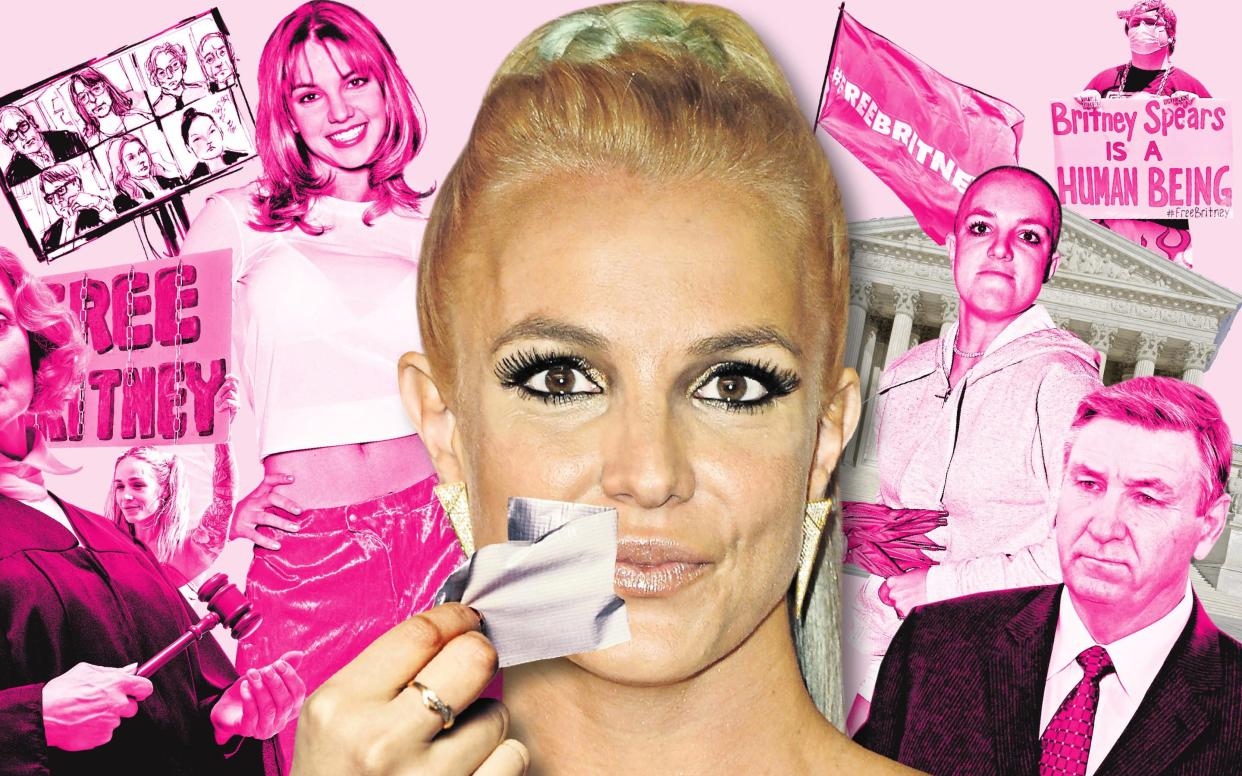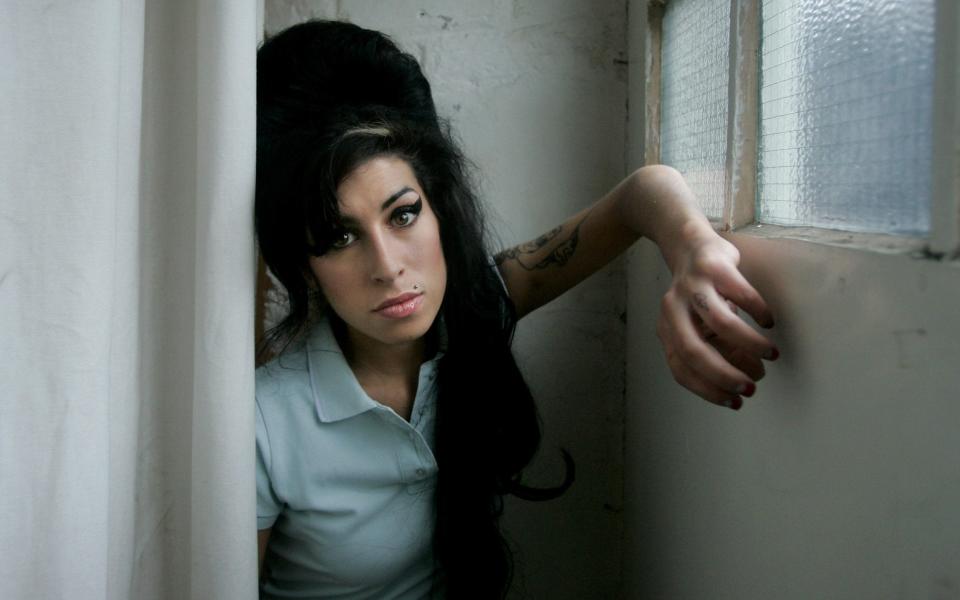Britney’s battle: is she being protected by her father or abused?

- Oops!Something went wrong.Please try again later.
- Oops!Something went wrong.Please try again later.
The shocking testimony of Britney Spears is yet another powerful reminder that 21st-century fame is, in the words of one of her most popular songs, toxic. The music business is again shown to have failed in its duty of care to the young stars it so ruthlessly exploits.
In an angry 23-minute speech on Wednesday, delivered remotely to a court in Los Angeles, Spears, 39, complained that every aspect of her money and lifestyle was controlled by others, while she continues to generate millions through lucrative recording and touring.
Among Spears’s most disturbing claims was that she was forced to have a contraceptive device inserted, and forbidden to marry again. She claimed she had been made to take the powerful mood-stabilising drug lithium against her wishes, which left her feeling drunk. It was clear she viewed it as punishment for her refusal to go on another tiring tour.
The star wrote to her fans on Instagram on Thursday, saying she was sorry for "pretending like I've been OK the past two years". In her typically esoteric social media style, she wrote: “I just want to tell you guys a little secret … I believe as people we all want the fairytale life and by the way I’ve posted … my life seems to look and be pretty amazing … I think that’s what we all strive for ... I’m bringing this to people's attention because I don’t want people to think my life is perfect because IT’S DEFINITELY NOT AT ALL."
Once a sassy pop singer who dripped sweat in a teasingly choreographed video for her 2001 hit I’m a Slave 4 U, she firmly told the court she was “not here to be a slave”. Spears described a hellish-sounding existence in which she had spent 13 years in a house with 24/7 security and no privacy, where her every deed was monitored, leaving her depressed and frustrated. “I’m so angry, it’s insane,” she said, a choice of words that cut to the complicated core of this tragic case. How can you prove your sanity when the very circumstances of your life are conspiring to drive you mad?
To briefly recap, Britney’s father, Jamie Spears, took effective control of her life and $60 million (£43 million) estate after her agonisingly public psychological breakdown in 2007, when she was seen shaving her iconic blonde hair at a Los Angeles hair salon, under the full glare of the Hollywood paparazzi; and a few weeks later was filmed attacking a photographer with an umbrella. She entered rehab, and lost custody of her two sons to her second husband, Kevin Federline.
Spears Sr used a sometimes controversial Californian legal procedure known as conservatorship, in which a judge decides a person is mentally incapable of controlling their finances. That power is given to a “conservator”, usually a close family member. To the “Free Britney” campaigners who crowded with placards outside the court, conservatorships are synonymous with abuse and exploitation, filled with echoes of gaslighting and lurid Victorian melodramas in which sinister Svengalis exert control innocent wards.
In principle, legal experts explain, the process exists for good reasons – to prevent mentally ill people from falling into poverty by giving their money away to a fraudster, for example. The UK equivalent, deputyships, granted by the Court of Protection, are similarly well-intentioned.
“We don’t know all the facts in Britney’s case,” says Paula Rhone-Adrien, a family barrister, of Lamb Building Chambers in London. “We have to remember that this has gone before a judge who had to consider a wealth of evidence, not just from Britney’s father. There would have been medical evidence; she would have been assessed by an expert. A court has found that her mental health needs are to such an extent that she cannot make decisions.”
She fears coverage of the case has become a “celebrity circus”; fans should not assume they know better than a judge. “If we can’t rely on the decision of an objective adjudicator, then where are we?” she says.
After a fan-led #FreeBritney campaign and detailed investigation by The New York Times for last year’s documentary Framing Britney Spears, it has become evident that Spears opposed her father’s role from the start. Beset by bankruptcy and alcohol problems, and divorced from the singer’s mother, Jamie never played a big role in his daughter’s career before gaining control of her finances in 2008. He claims he has always acted out of love, and that the conservatorship averted tragedy.

Yet there are obvious conflicts in a system put in place where a legal protector benefits financially from their charge remaining under their protection. Jamie has earnt $16,000 (£12,000) a month for his role, plus significant percentages of the millions his daughter makes from touring and merchandise. This would be difficult, if not impossible, under the law in England and Wales, say experts, where those in charge of deputyships must submit a report each year, including a rigorous explanation for any sum they award themselves bigger than £500. In a widely noted legal irony, the pop star also foots the bill for her father’s lawyers, who are working to restrict her freedom.
The case raises other questions, too. How did we get to a position where one of the biggest pop singers of our times, a much-loved multimillionaire superstar who has been a household name since she was a teenager, winds up in court tearfully comparing herself to a victim of sex trafficking?
To many, it is more evidence of something intrinsically awry with the very system by which the music industry nurtures and exploits young talent, particularly young women.
Last week, the Scottish singer Shirley Manson of Garbage, the American alternative rock group, expressed frustration in The Telegraph with an industry that’s “entirely unregulated, that legitimises the selling of teenagers. The insatiable appetite for young flesh is sickening. Children should not be used to make money for big corporations.”
Spears, of course, was 10 when she first appeared in the Mickey Mouse Club TV series; 15 when she signed with Jive Records; and 16 when she released her debut single, ...Baby One More Time, with a video that cast her as a sexy schoolgirl. Most of her early music was written and produced by teams of older men.

It’s easy to see parallels with the story of Amy Winehouse, who died from alcohol poisoning exacerbated by bulimia in 2011. Winehouse operated in a different area of music – more soul than pop – but she, too, was a teenage prodigy whose life spun out of control under the pressures of extreme fame and paparazzi harassment. A newly published memoir, My Amy, by her closest friend Tyler James, describes how she was indulged and infantilised by the music industry, and yet left unprotected when she was most in need. Those who benefited from her success were perhaps not best placed to look out for her personal interests, it has been suggested.
Indeed, the revelations have left some Britney watchers feeling awkward, as if they were complicit in an exploitative sham. Sarah Ditum, a feminist commentator and fan from the start, remembers watching the singer in Scarborough in 2018. “She was tremendous – every move on point, every song an event,” she says. “But there was still a guilty fear that I was watching someone who didn’t want to be there.
“Now I know that my suspicions were well-founded... What’s clear too is that Britney’s priority is her private, not her public, life.” The most valuable thing fans could do now, Ditum thinks, is “let her slip into self-determined obscurity”.
Removing yourself from a conservatorship, however, is complex and legally messy. In California, the person has to convince a judge they are no longer mentally incapable, but doctors may testify with different opinions.
It’s a similar process in England and Wales – but, in his 14 years of dealing with deputyships, Robert Lee, head of wills and probate at MSB Solicitors in Liverpool, has never known anybody to “escape”. “The person’s mental impairment would [normally] only become worse,” says Lee, who is surprised that Spears is still deemed mentally incapable, given she has released three albums during the conservatorship.
Campaigners will be heartened to see young stars now putting mental health first. Billie Eilish, 19, the American singer, has spoken openly about her depression and self-harm. Yet until the music industry implements proper safeguards, further tragedies seem inevitable. Hopefully, Spears’s story is ultimately one with a more upbeat trajectory, of a woman taking back control.
This piece was originally published yesterday and has since been updated with additional reporting

